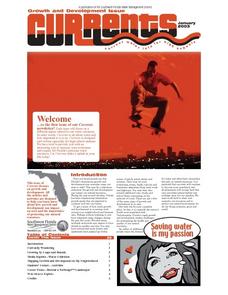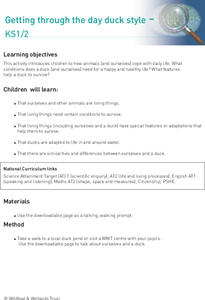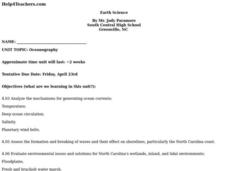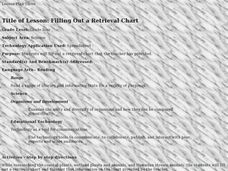Curated OER
Estuary Issues
Fifth graders read a description of an estuary and search for problems that occur there. In this estuary lesson, 5th graders mediate controversial issues for the best solutions.
Curated OER
Exploring Our Watershed System
Students study watersheds and examine how they are composed. In this watershed system instructional activity students explain how water enters a watershed and the concept of stream order.
Curated OER
Currents 2003
In this environment learning exercise, students read an article about growth and development of population and the environment. They respond to various types of questions throughout the article packet pertaining to what they read and why.
Curated OER
How do rice farmers make good use of the land they use for planting rice?
Second graders discuss how farmers grow rice. In this rice growing activity, 2nd graders see the optimal condition for land in order to grow rice. They experiment with clay and garden soil to see which holds water better.
Curated OER
March Market
Students role play a living wetland food web. They trace the food web associated with the items in their lunch.
Curated OER
Wetlands - Frog Facts Song
In this frog facts song worksheet, students follow directions on how to compose a song using frog facts. Students pick a well known children's song, gather facts about frogs, and then write new lyrics to the children's song.
Curated OER
Magical Images of the Estuary
Students investigate picture taking techniques while visiting an estuary. In this picture taking activity, students examine the "Magical Images of the Estuary" handout. They think of and list important picture taking techniques before...
Curated OER
Getting Through the Day Duck Style
Students observe ducks at a local wetland. They answer various questions about the ducks behavior and write the answers on a downloadable worksheet.
National Wildlife Federation
The Tide is High, but I’m Holding On… Using ICESat Data to Investigate Sea Level Rise
Based on the rate of melting observed from 2003-2007 in Greenland, it would take less than 10 minutes to fill the Dallas Cowboys' Stadium. The 17th lesson in a series of 21 has scholars use the ICESat data to understand the ice mass...
Curated OER
Katrina Case Study: Watershed
Learners explore the importance of the coastal wetlands. For this environmental lesson, students observe a model of wetland transformation over time. They discuss what changes occur in the wetlands and how hurricanes can affect the...
Curated OER
Animals Around Us
Students view and discuss a Discovery Channel video that compares the animals found in four different habitats. They compare and contrast the characteristics of forests, deserts, wetlands and grasslands then choose one to depict in a...
Curated OER
Ecology Community Status
In this ecology community status worksheet, students research their state's ecosystem, make a chart of the biodiversity, analyze the chart and identify issues with wetland species. This page has several links to helpful web resources.
Curated OER
Talking Duck
Students visit a local wetland or WWT centre and record their observations by writing or drawing on the downloadable pupil activity sheet.
Curated OER
Gallery Walk Questions about Energy and Material Cycles
Students state the physical, chemical or biological processes associated with these environments: Pelagic ocean zone, California coat Cave, Indiana Barrier island beach, North Carolina Sand dune, Dunes National Park, Colorado Wetland and...
Curated OER
Earth Science
High schoolers analyze the mechanisms for generating ocean currents, temperature, and deep ocean circulation. They are able to assess the formation and breaking of waves and their effect on shorelines, particularly the North Carolina...
Curated OER
"HOW I USE PLANTS" COLLAGE
Students create a collage that depicts the different ways they, as individuals, use plants. They describe ways in which humans use plants for food, shelter, and clothing and ways in which humans can protect natural areas to maintain...
Curated OER
Naturalist's Notebook
Students observe and record the behavior of a San Diego wetland animal and the characteristics of its environment. The amount of time that each animal spends resting, grooming, eating, flying, and social or individual play becomes the...
Curated OER
Filling Out a Retrieval Chart
Fourth graders generate a spreadsheet that includes research about coastal plants, wetland plants and animals and Hawaiian stream animals.
May Media Group
Treatment Plants
Young scientists explore nature's water treatment plants in this simple science demonstration. By placing a stalk of celery in a cup of water mixed with food coloring, children are able to observe how plants absorb nutrients and...
Illinois Department of Natural Resources
Section Two: Why is Biodiversity Important?
Explore soil, genetic traits, natural resources, and pollution in a series of lessons that focus on biodiversity. Kids complete experiments to learn more about the importance of varied genes and organisms in an ecosystem.
Curated OER
The Marvels of Mud
Young scientists roll up their sleeves and get a little dirty in this three-day earth science investigation. Following the scientific method, children monitor the growth of algae in pond water samples in order to determine...
National Wildlife Federation
Gator Hole Graphics
Climate changes are cyclic so how do these changes impact species that live in different habitats? Learners examine the rainfall levels in a specific swamp habitat. They also review graphical data and tell a story about how the...
Los Angeles Unified School District
River Systems
Scholars must react to the ecosystems of a river. They use inquiry-based learning along with maps and visuals to better understand the impact of rivers on everyday life. To finish, they create final written projects and presentations.
Alabama Wildlife Federation
Life in a Pond
What living things call an aquatic habitat home? Young learners consider the question after they discuss the characteristics of a typical pond habitat. They identify an animal and then determine if a pond would have all the components to...
Other popular searches
- Louisiana Wetlands
- Animal Adaptations +Wetlands
- Animal Adaptations Wetlands
- Freshwater Wetlands
- Animals of the Wetlands
- Wetlands Water Cycle Diagram
- Watersheds and Wetlands
- Inland Wetlands
- Project Wetlands
- Wetland Soil Classification
- Wetlands Habitat
- Abc Book on Wetlands























